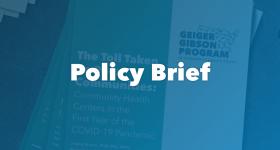In thousands of medically underserved rural and urban communities, community health centers played a vital role in the first year of the COVID-19 pandemic. With crucial financial support through supplemental grants and Medicaid, health centers tested more than 3.7 million patients for the novel coronavirus and cared for nearly 745,000 patients with COVID-19, while also demonstrating their ability to rapidly adapt to pandemic operating conditions.



